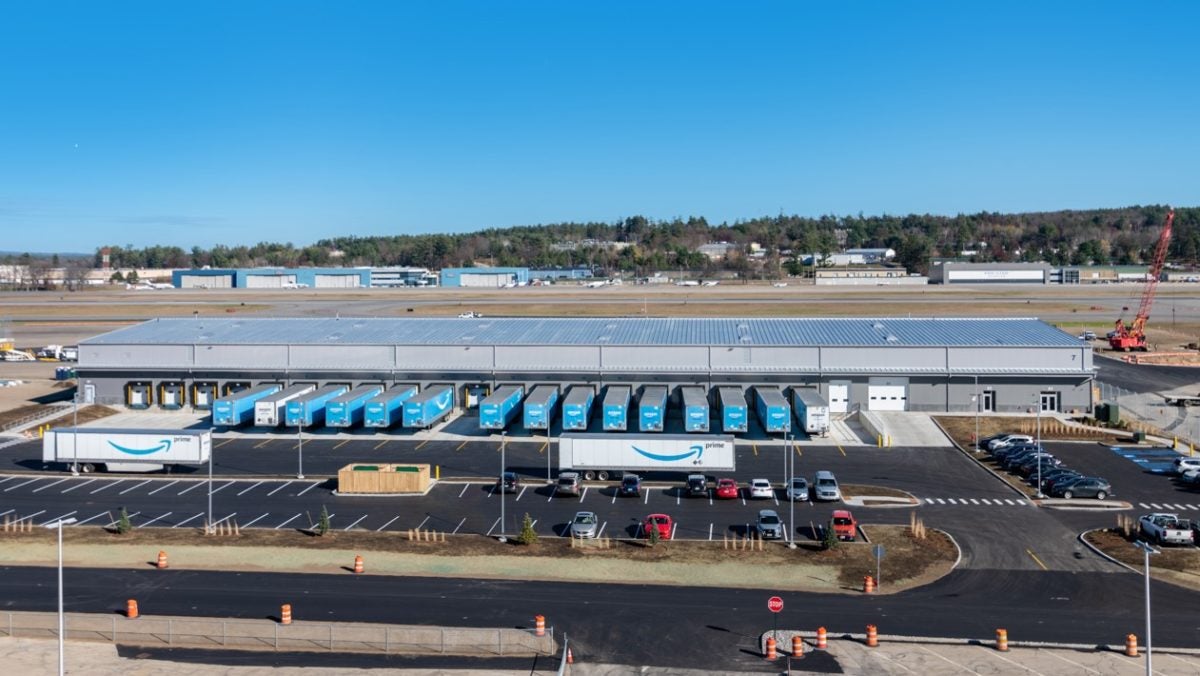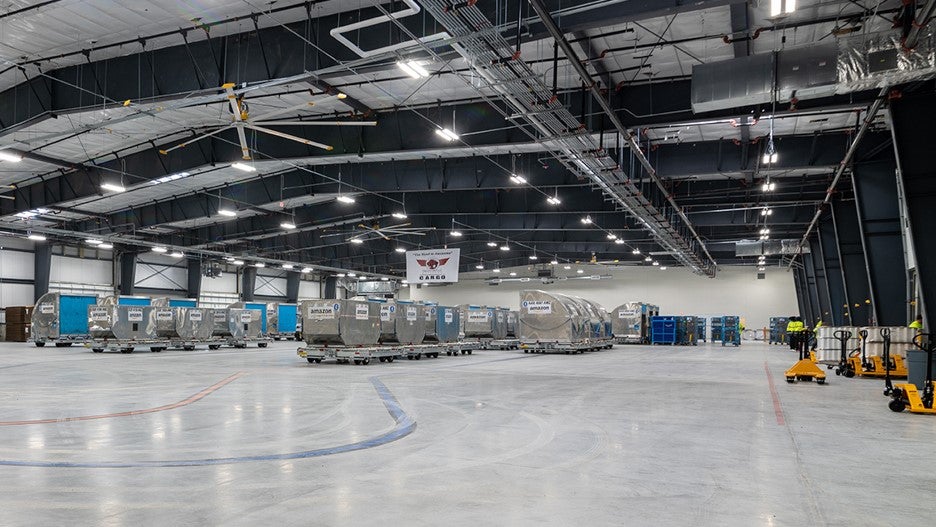(UPDATED: 12:02 PM ET)
An Amazon cargo jet made the first delivery to a new air cargo facility at Manchester-Boston Regional Airport (MHT) on Thursday morning, marking the extension of the electronic retailer’s air network to enable faster online deliveries in New England.
The e-commerce giant’s private airline, Amazon Air, will provide daily service to Manchester, New Hampshire, from its hub at Cincinnati/Northern Kentucky International Airport with a Boeing 767-300 aircraft operated by partner Atlas Air (NASDAQ: AAWW), MTH announced. As volumes grow, more flights are expected to be added.
Realterm, an on-airport real estate investment firm, built a 63,400-square-foot cargo terminal on land it is leasing from Manchester-Boston Regional Airport. The site, just off the 9,250-foot runway, can be expanded to 100,000 square feet if needed.
Amazon (NASDAQ: AMZN) will occupy 80% of the building, which also has three parking positions for large aircraft.

The new facility will help Amazon with fulfillment times because a large volume of orders are trucked to New England. From the airport, Amazon trucks can easily access the Greater Boston metropolitan area, as well as northern New England. Five million consumers live within a two-hour drive of the airport.
A large warehouse being built in Manchester will be used by Amazon as a fulfillment center, according to local reports.
Manchester-Boston already receives FedEx Express and UPS overflow traffic from crowded Boston Logan International Airport. It achieved record cargo volumes the past three years.
“We’re confident as cargo requirements in the area grow and with Logan having their constraints right now about the future of Manchester as a relief valve,” Alexi Lachambre, Realterm’s vice president of airport infrastructure investments, told FreightWaves.
MHT is 50 miles north of Boston.
The project was spearheaded by Ted Kitchens, who took over as airport director four years ago and wanted to strengthen the airport’s cargo presence. The new facility more than doubles MHT’s cargo warehouse space.
The parties initially envisioned a three-year timeline to complete construction when the ground lease was announced in 2021, but it came in well ahead of schedule and within budget.
Amazon has selected Trego-Dugan Aviation as its ground handling partner.
Aeroterm is looking for a tenant to fill the remaining 10,000 square feet in the cargo terminal.
“I’m thrilled to see the completion of the new cargo facility apron at MHT, which will nearly double the airport’s cargo capacity and lower transportation costs while supporting local businesses and promoting job creation throughout the region,” said Sen. Jeanne Shaheen, D-N.H. “When I fought to secure $7.8 million for this project in the fiscal year 2022 federal government funding law, I knew it was going to be a smart investment for our state.”

Amazon Air has more than 110 aircraft in its fleet. They are operated by contract carriers, such as Atlas Air, in the U.S. and Europe. This year, the company has added airport gateways in El Paso, Texas; Las Vegas; and Lihue, Hawaii, putting more than 73% of the U.S. population within 100 miles of one of its airports.
In early November, Amazon launched daily cargo service to Mobile International Airport in Alabama from its regional hub at Alliance Field in Fort Worth, Texas. Amazon leased a 16,000-square foot facility to sort and load Amazon packages. The company has operations at more than 50 airports across the U.S.
Amazon recently has eased the pace at which it adds flights to its U.S. network in response to reduced consumer spending. E-commerce sales are growing less than half as fast as a year ago and nearly four points less than in 2019 after quadrupling during the height of the pandemic, according to figures from the U.S. Commerce Department. Still, 7% growth in first-half U.S. e-commerce sales is strong by most retail standards. Online shopping now accounts for more than 20% of all retail sales.
More FreightWaves/American Shipper stories by Eric Kulisch.
Subscribe to the American Shipper Air newsletter.
RECOMMENDED READING:
Amazon dials back air cargo expansion as e-commerce sales slow








Katie Stone
An interesting discussion is definitely worth comment. There’s no doubt that that you ought to publish more about this subject, it may not be a taboo matter but usually people don’t speak about these subjects. To the next! Kind regards!!
Christopher J Luiz
I am in need of a job. 9
Christopher J Luiz
Jobs?